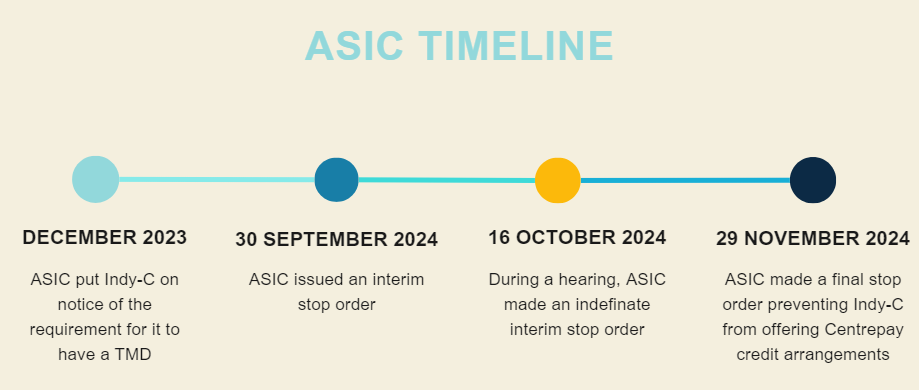ASIC puts a stop to Centrepay credit arrangements | Another cautionary tale for financial institutions and credit providers
Earlier today, the Australian Securities and Investments Commission (ASIC) issued a final stop order against Indy-C-Fashion Accessories Pty Ltd (Indy-C), effectively preventing the company from offering Centrepay credit arrangements to consumers at its Katherine store. This decisive action follows an ASIC Delegate’s determination that Indy-C failed to make a Target Market Determination (TMD), a crucial requirement to ensure that financial products are suitable for consumers’ needs and objectives.
This is the second time ASIC has made a final stop order to prevent a business from offering vulnerable consumers a credit arrangement where it considers the arrangement to be non-compliant with the DDO regime, and should serve as a warning to all financial institutions that ASIC is continuing to use its full range of powers, including stop orders, to disrupt non-compliant practices.

How was ASIC first alerted to this potential non-compliance?
In 2023, ASIC received complaints through consumer networks and engagements with ASIC’s Indigenous Outreach Program, suggesting that deductions paid to Indy-C in connection with its Centrepay credit arrangements may be detrimental to those consumers’ financial situation.
Indy-C offered credit through deferred deduction arrangements via Centrepay, and was therefore required to comply with DDO, which included the requirement to:
- design and distribute financial products, such as credit facilities, with appropriate consideration of consumers’ likely needs and objectives, and
- take reasonable steps to ensure that those products were distributed consistently with the nominated target market.
By offering its credit arrangement, it was required to publish a TMD, a document which must identify the target market and outline the conditions on the way in which the product is distributed, amongst other things.
In response to these complaints, ASIC undertook an investigation into the practices of Indy-C and identified that it did not have a TMD setting out, among other things:
- the details of the target market that it intended to distribute its credit arrangements within, and
- distribution conditions that would make it likely consumers are in the target market.
An initial warning!
In December 2023, ASIC put Indy-C on notice of the complaints it had received as well as the underlying requirement for Indy-C to have a TMD.
Despite this, Indy-C did not rectify this issue and continued to operate without a TMD in place.
Ten months later and still no changes | ASIC issues interim stop order
On 30 September 2024, ASIC made an interim stop order against Indy-C, preventing it from entering new Centrepay credit arrangements with consumers to pay for goods via deductions from their Centrelink benefits, due to its failure to make a TMD. The interim stop order was initially to be in place for 21 days.
During this period, Indy-C submitted a number of draft TMDs to ASIC in an effort to address its concerns – with ASIC even providing additional time for Indy-C to address the deficiencies it identified in the draft TMDs. Despite this, Indy-C was not able to produce a compliant TMD and relevant policies to prevent vulnerable consumers from entering into the credit arrangements. As a result, ASIC was satisfied that:
- Indy-C had not rectified its breach of its DDO obligations as its TMD was not adequate, and
- if Indy-C did offer the credit arrangements to consumers in the way it described in its TMD, it was not reasonable to conclude that it would be likely that those consumers would be within the identified target market
ASIC issues indefinite stop order
On 16 October 2024, during a hearing, ASIC made a further interim stop order (in the form of an indefinite stop order) prohibiting the same conduct covered by the initial interim order. At the time, ASIC confirmed that it would further consider submissions made by Indy-C during and after the hearing to determine whether the indefinite interim stop order remains in place.
ASIC orders stop to Centrepay credit arrangements altogether
On 29 November 2024, ASIC made a final stop order – which permanently stope Indy-C from offering CentrePay credit arrangements to consumers in its store in Katherine.
ASIC Deputy Chair Sarah Court made the following comments:
Indy-C provided credit arrangements to First Nations consumers to purchase clothing and household goods via deductions from their Centrelink benefit payments in circumstances where ASIC considers it did so without considering whether the credit arrangement would be consistent with the consumer’s objectives, financial situation, and needs. Following regulatory action from ASIC, Indy-C made multiple draft TMDs, however ASIC considers none complied with Indy-C’s design and distribution obligations.
The decision made by ASIC should now see the finalisation of this matter – though, it must be noted that Indy-C retains a right of review of this decision in the Administrative Review Tribunal.
Need help complying with the DDO regime?
If you are a financial institution and are looking to understand your obligations under the DDO regime or if you are looking to review your processes or policies as result of these ASIC proceedings, please get in touch with us.
Table of Contents
Posted in Design and Distribution Obligations

